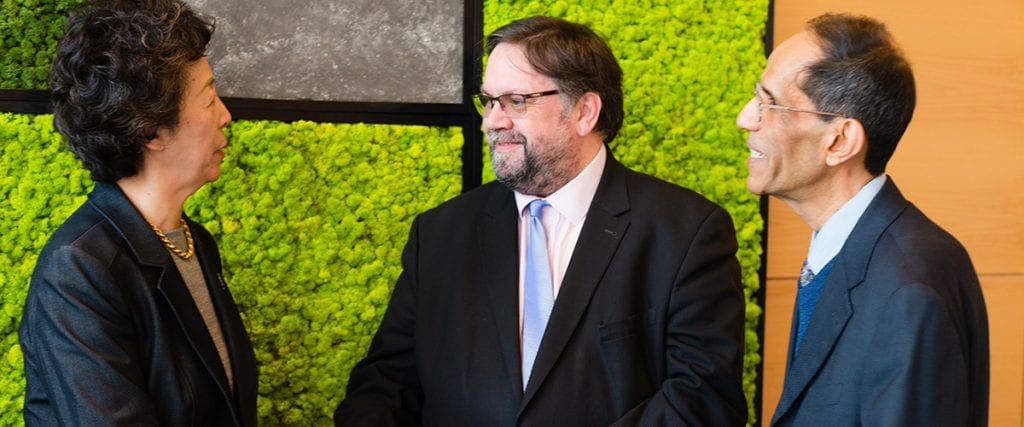Friday News Roundup – Rutgers Accounting Partnership Announced, and More

Let’s take a look at some of the biggest stories from this week, including Rutgers accounting expanding.
Rutgers To Offer Accounting Students International Exposure – Rutgers Business School News
Rutgers Business School has partnered with the Chartered Institute of Public Finance and Accountancy (CIPFA) to give certified students the ability to offer public finance services in countries outside the U.S.
The memo of understanding between Rutgers and CIPFA states that current students and graduates of the Masters in Governmental Accounting Program can qualify to practice internationally after completing the online certification course, which will begin in September 2019.
Among the advantages of the CFA designation are access to networking opportunities, seminars, and ongoing professional development throughout one’s career—in addition to the ability to practice internationally. Rob Whiteman, Chief Executive Officer of CIPFA, says of the agreement. “CIPFA is delighted to be entering into a partnership with Rutgers University that will allow us to share our expertise and explore common goals to the benefit, not only of the students, but the public sector globally, which can only gain through greater cooperation among government accountants … [the] memorandum of understanding will enable the development and retention of top talent for government accounting.”

CIPFA CEO Rob Whiteman (center), alongside Dean Lei Lei (left) and Professor Irfan Bora at the Feb. 27 signing. / Photo via business.rutgers.edu
Click here for more about the CIPFA and Masters in Governmental Accounting program.
LeBow Hosts Webinar for Customizable MBA and More – Lebow News
On March 12, 2019 from 12-1 p.m., Drexel University’s LeBow College of Business will host a webinar for those interested in its customizable MBA. Information will also be available on all other postgraduate business education.
The session is open to all current and future students, and to full time, part time and international students.
Attendees will be able to connect one-on-one with admissions staff during the webinar, which will cover the following: full-time MBA; part-time MBA on the Philadelphia campus and in Malvern; the Online MBA; and the Masters programs in Accounting, Business Analytics, Economics, Supply Chain Management and Logistics, Marketing, and Quantitative Finance.
To register for the webinar, click here.
Goizueta Panelists on the State of Healthcare in 2040 – Goizueta Business School Insights
Emory University’s Goizueta Business School recently hosted a panel of senior managers from multiple healthcare sectors who made predictions on the future of the industry for both providers and consumers. Moderated by Associate Professor in the Practice of Organization and Management Renee Dye, the panel’s discussion focused specifically on the state of healthcare in the year 2040.
Panelists Jeff Fusile, President of Blue Cross and Blue Shield of Georgia; Judith Monroe, President and CEO of the CDC Foundation; Dane C. Peterson, Chief Operating Officer of Emory Healthcare; and Mike Van Den Eynde, Managing Director of Deloitte Strategy and Operations at Deloitte all contributed their insights at the February event.
Jeff Fusile commented on the rising cost of insurance:
“More than half of a family’s gross income goes to cover the average family of four’s healthcare cost—not a sick family, not a healthy family, the average family … “If we don’t make a change, 10 years from now, maybe 20 years from now, we’ll be here saying, ‘Now it costs 100 percent of your gross income.’”
Monroe’s remarks pointed out the complex factors involved in the growth of healthcare:
“The future really will depend on a complex web of things, all the way from science, technology and data to economics, political factors, social factors and certainly environmental factors … By 2040, we’re going to have new devices that we can’t imagine today. When you wake up, you’re going to have real-time blood pressure, biometrics and blood chemistries.”
Each panelist pointed out the vast changes that healthcare tech will undergo, along with the shift that will be necessary in order for the healthcare business to become consumer focus as opposed to profit driven.
Check out more from the recent panel here.
Loyola’s Sellinger School Announces New Classes in Downtown Baltimore – Loyola News
Loyola University Maryland’s Sellinger School of Business has announced that it will offer classes for its new Professional’s MBA hybrid cohort in Downtown Baltimore.
The Center Club at the Transamerica Building will be home to the cohort, which meets in conference rooms on Mondays from 6:30-9 p.m. The Professional’s MBA (PMBA) is offered as a part-time degree for professionals from all backgrounds, and it is designed so that students may pursue the degree at their own pace.

The Transamerica Building, the tallest in Baltimore, will host classes for the Sellinger School of Business Professional’s MBA hybrid cohort.
“We are delighted to open a downtown location that will bring our excellent business courses we offer into the heart of Baltimore …So many professionals live and work [here], and Loyola wants to meet them where they are,” says Sellinger Dean Kathleen A. Getz, Ph.D.
PMBA students, who will take 33-42 credits, will complete the remainder of the coursework online, but the Center Club will be the cohort’s hub for meeting and learning. For registration info and more on the PMBA click here.
Mendoza College of Business’ New “Interterm” Gives Real World Experience – Mendoza News
University of Notre Dame’s Mendoza College of Business now offers a unique course in which students can flex real world skills while earning credits and providing community service.
The “Interterm” is offered in the first week of March, and it is meant to promote engagement with organizational partners to complete a selection of projects that will benefit the company, the student, and the surrounding community. Thirty-four partners from across the country signed on for Interterm. Among them was HUNGRY, a catering company in Washington, D.C.; Waves for Water, which helped distribute filtration kits to those affected by Hurricane Maria, and the Catholic Volunteer Network, which will partner students with young people in Takoma Park, MD.
After an extensive survey process with Mendoza’s MBAs, the program was revamped from classroom case-studies to the experiential learning model that it used this year. Alice Obermiller, Associate Director for Experiential Learning in Graduate Business Programs says of the new curriculum, “[Students] wanted to engage in activities that tangibly built up their resume with demonstrated experiences working on real and timely issues … like most of us, [students] have many competing priorities, so they want to engage in things purposefully and that serve them most at the time.”
In addition to the Interterm projects, students will be able to take part in international immersion programs in China, South America, and South Africa. For more on Interterm and the immersion programs, click here.
Improved Candidates, Working in Puerto Rico, and More – Chicago News

Let’s explore some of the most interesting stories that have emerged from Chicago business schools this week.
Take 5: Tips for Widening — and Improving — Your Candidate Pool – Kellogg Insight
Northwestern Kellogg Associate Professor of Management and Organizations Lauren Rivera and Professor of Finance Paola Sapienza recently published new research that offers discrete advice on how to “widen the talent pool, whether by uncovering your own hiring biases or by turning your sights to often-overlooked candidates.”
1. Be Aware of Biases
According to the article, “Even when we set out to hire on the basis of merit, hidden biases can get in the way. Being aware of those can help us not only act more fairly, but also make the best business decisions.” For instance, “Hiring managers also tend to look for a sense of personal connection with an applicant — with upper-class interviewers generally preferring candidates with similar pedigrees, whether they realize it or not.”
2. Think Small Specialist
According to the article, the late professor of management and organizations Keith Murnighan “found evidence of a bias towards generalists over specialists because hiring managers tend to look for one employee at a time — rather than hire an entire team all at once — it’s hard for them to see exactly which specialists they need.”
Murnighan wrote, “Look at the interactions from a distance and say, ‘What is it that I need to change? What do I know that I’m too close to the process to really see?’”
3. Look to Local Talent
Professors Rivera and Sapienza encourage companies to focus on hiring local talent so “reps are able to build solid relationships with their accounts.” In other words, “firms whose success depends on establishing themselves as a “local” brand should consider the importance of thinking — and hiring — locally.”
4. Value Veterans
Many companies overlook veterans as viable candidates, which is a shame because the military “fosters collaboration, adaptability, leadership, selflessness, and many other qualities that make veterans invaluable in the business world. The article cites research from Kellogg finance professors Efraim Benmelech and Carola Frydman who found that “firms run by CEOs with military experience performed better under pressure than those run by other CEOs.” They also found that “CEOs with a military background were up to 70 percent less likely to engage in corporate fraud compared to their civilian-only peers.”
5. Consider the Ex-Offender
Another population that job searches tend to neglect is ex-offenders. According to the article, “Many employers are reluctant to hire people with criminal records, assuming that they possess fewer skills, are more likely to behave unethically in the workplace, or both.”
“Not only can doing so save money on turnover costs, but from a societal level, it also can help keep ex-offenders from going to jail again.
Research from professor of managerial economics and decision sciences Nicola Persico, finds that “ex-offenders who do get hired are no more likely to be fired than non-offenders — and are about 13 percent less likely to quit, resulting in lower turnover costs for the companies that hire them.”
You can read the rest of the article here.
Testing the Waters: How a Team of MBA Students Put Their Business Skills to Work in Puerto Rico – Mendoza Ideas & News

Notre Dame MBA candidate Corey Waldrep ’19 samples the result of a low-cost water filtration kit in Puerto Rico. On the right is dirty, debris-filled water and on the left is filtered water. (Photo by Matt Cashore/University of Notre Dame)
Last month, Notre Dame Mendoza College of Business MBA students and former military veterans Tyler Shields, Luke Wilson, Dan Weathers, Corey Waldrep, and Robert (R.J.) Dulin, as well as advisor Andrew Wendelborn, traveled to Puerto Rico as part of nonprofit Waves for Water’s initiative to provide global access to clean water in the aftermath of Hurricane Maria, whose 175 mph winds “destroyed more than 80 percent of the island’s power lines and left 3.4 million Americans in the dark” last September.
According to the article, the objectives of project were for “students to gather and utilize important demographic data; gain first-hand experience in working with an NGO partner to provide crisis support; learn a model for creating self-sustaining practices for local populations; and become immersed in best practices for working with indigent populations with dignity, equality and compassion.”
Shields writes, “A lot of what we did over there in Puerto Rico was so-called guerrilla humanitarianism. You don’t necessarily know where the need is or what the need is. You just know that there is a need.”
You can read more from the article here.
As Uber, Lyft Eye Public Offerings, Gies Professor Says Clock Could Work to Smaller Rival’s Advantage – Gies College of Business News
University of Illinois Gies College of Business Clinical Assistant Professor of Finance Rob Metzger took to the blog to offer his expertise drawn from 20 years in investment banking on whether Lyft or Uber should go public first.
According to the article, Uber’s $120 billion IPO is more likely to go public first in late 2019. But Lyft’s roughly $15 billion IPO could beat them to the punch in spring of 2019.
Metzger writes, “I think the Lyft team feels that, even though they’re significantly smaller, they believe that their financial metrics are better, their operating metrics are better, and they haven’t had some of the negative press that Uber has had.
“So [Lyft] may want to be out on the forefront to tell that story, as opposed to being in Uber’s shadow.”
